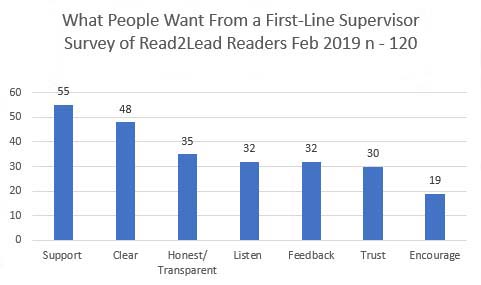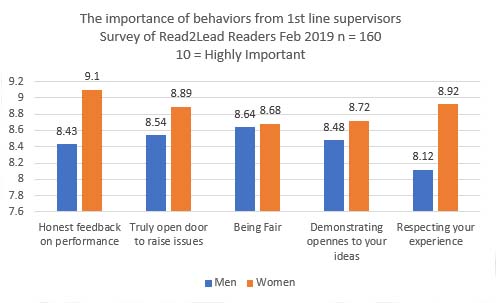Podcast: Play in new window | Download
 NOTE: I will be presenting at the TEDx Berkeley event this coming Saturday, March 9. Tickets are available by clicking here. Enter SPEAKER-NETWORK for a 35% discount.
NOTE: I will be presenting at the TEDx Berkeley event this coming Saturday, March 9. Tickets are available by clicking here. Enter SPEAKER-NETWORK for a 35% discount.
Supervisors
Two weeks ago I invited your thoughts on what it is we want from first-level leaders. So, today a simple report out from the 165 respondents among you, whom I thank for taking the time to respond to the survey! I think you’ll find the responses useful, whether you are such a supervisor, or perhaps a manager of supervisors, or just curious about leadership and management.
I offered respondents two ways to respond: an open-ended question where they could name the things most important to a front-line worker, and a question that gave them choices they could rate.
When given the open-ended question, here are the top words chosen by the 120 respondents for that portion:
I found it fascinating that the terms support, supporting, supportive were not concepts that I had identified when I gave respondents nineteen specific choices, but this came out on top.
Nor, despite my near-obsession with the power of listening-in-leadership, had I explicitly offered that as a choice for respondents. But, as you can see from the chart, these were extremely important. And in the chart below, all of those first five attributes reflect a great deal of communication. It is such a reminder that first-level supervisors may act like individual contributors, but the people through whom they get results need to be actively engaged. As we enter March Madness, it reminds me of the basketball coaches you see who are just constantly in communication with their players. When you think of how easy it is for a supervisor to forget all that their new workers don’t know or need to hear, the chart makes so much sense: support, listen, feedback.

The second table provides the results from this question: How important to you is (or was) it to get the following from a front line supervisor? Where 1 = Least Important and 10 = Most Important:
The top 5 behaviors are listed. These were the top 5 – from 19 choices that were offered – for both men and women, yet there was some variation in terms of the importance based upon gender.
Fairness and having a truly open door were of highest importance to men, while honest feedback and respect for experience were highest for women.

Again, it’s worth noting that “support” and “listening” were not offered as choices, but were offered at a very high rate by respondents when it came to the open-ended question. The point above remains extremely clear: Workers want engagement, as reflected in this chart by feedback, an open door, and openness to ideas. Although this research is not rigorous enough to draw statistically significant conclusions, one cannot help but be struck by the last pairing of bars in the second chart: women put a strong premium on having their experience respected. Perhaps this deserves attention in both our study and our practice. I wonder what comments you might share on this point about women’s desire for the experience to be respected, as well as the broader data, as we strive to
Lead with our best selves!


In personal relationship, marriage and partnership, mostly women want to feel respected and men want to feel cherished. Reflective of what is missing in the work place and our traditional notions of male/felmale.
Please say more, Marty. This seems a bit counter to the conventional wisdom which would suggest that women want the more emotional. Is it possible that you reversed what you meant to say? The data seem to suggest that women want substantive recognition for what they have done – more T than F, in the Myers-Briggs schema.
Actually, I thought what I said verrified what you said about women wanting their work respected.
My information is only anecdotal, in that I do a fair amout of counseling and when people are asking for guidance about their marriage/partnerships, very often women who have male partners often feel that the man does not really see her work as vital and important. Men often feel like only their earning power or the handyman type work they can do is really appreiated and they would like to feel loed (cherished) just for who they are.
Cherishment/respect in balance are often issues in relationships.
That was all that comment was about.